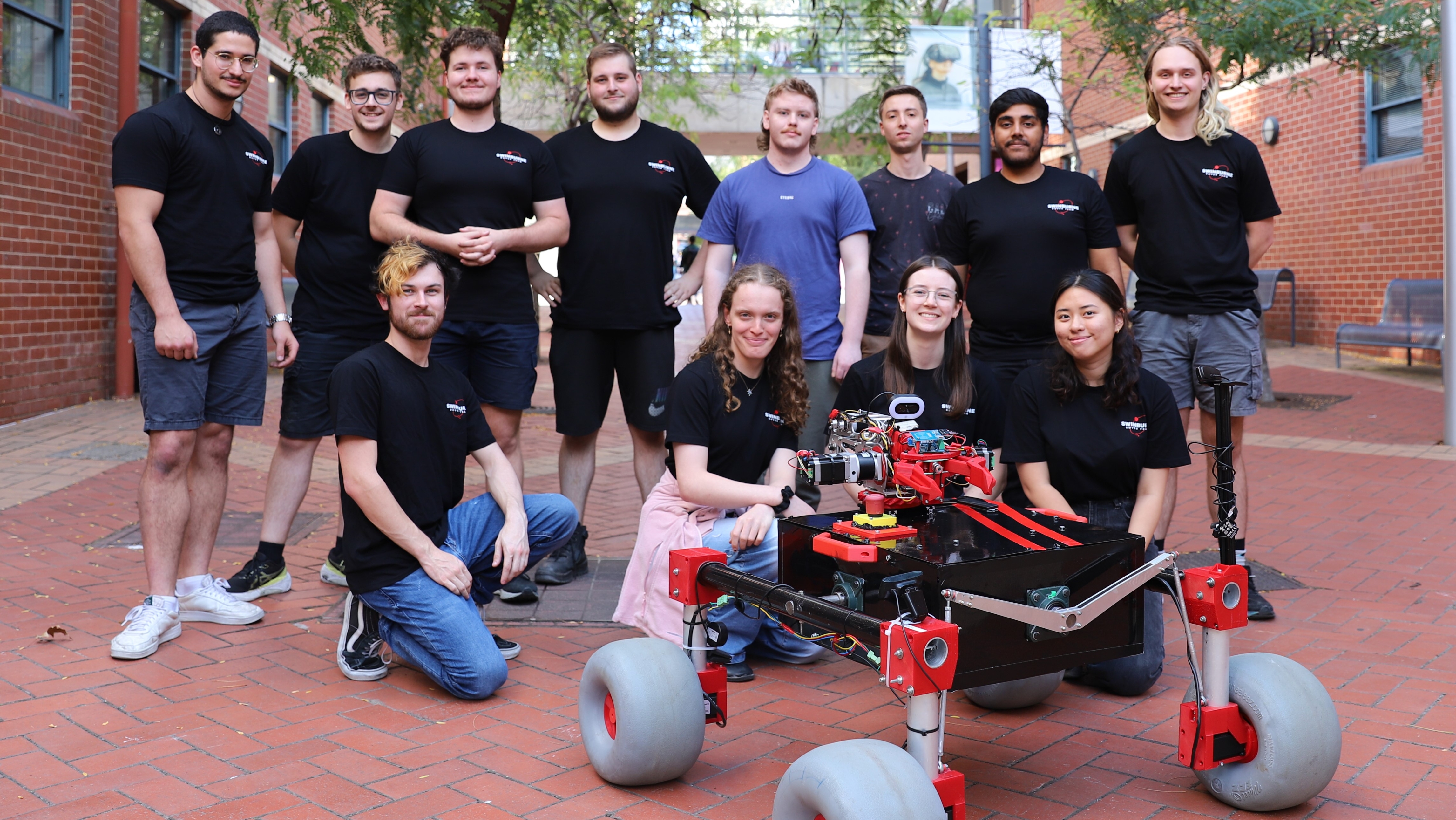Swinburne ‘Rock Muncher’ takes part in Australian Rover Challenge

The Swinburne team pictured with their rover, 'Rock Muncher'
In summary
- Swinburne’s Rover Team showcased their work at the 2024 Australian Rover Challenge
- The multidisciplinary student team unveiled their creation, the Swinburne ‘Rock Muncher’, representing months of collaborative effort towards simulated lunar navigation and construction
- With guidance from mentors Dr Rebecca Allen and Associate Professor Andrew Ang, the team aims to inspire future generations and highlight Swinburne's leadership in space technology
A multidisciplinary student team from Swinburne University of Technology competed in the 2024 Australian Rover Challenge held in Adelaide, South Australia. The Swinburne Rover Team’s creation, the Swinburne ‘Rock Muncher’, was a testament to months of tireless effort and cross-disciplinary collaboration.
The event took place in a custom-built simulated lunar environment, with student teams participating from across Australia.
Competing in three challenges, including a post-landing task, an excavation and construction task, and a space resources task, the Swinburne team showcased their lunar rover’s versatility and technical prowess.
Angelina The, the team’s business co-lead, said the project had a positive impact on the team’s personal and professional development.
"Being part of this project gave the team opportunities to not only improve soft skills such as teamwork, leadership and stress management, but also to develop professionally, by testing various technical skills. This project has definitely opened doors for us."
Mukul Chadha, fellow co-lead, said participating in the challenge was deeply rewarding.
"Having the chance to represent Swinburne in the Australian Rover Challenge as a pioneering entry has been amazing. As one of many teams participating, we represent a collective effort to further our space industry and workforce."
The Swinburne Rover Team's journey was guided by mentors Dr Rebecca Allen and Associate Professor Andrew Ang, co-directors of Swinburne's Space Technology and Industry Institute. Their mentorship reflects Swinburne's commitment to fostering excellence in space technology research and education.
"Watching the Swinburne Rover Team's progress has been inspiring. Their ingenuity and collaborative spirit epitomises the qualities needed by our next generation of space technology innovators,” said Dr Allen.
Following the Australian Rover Challenge, the Swinburne team aims to keep pushing the boundaries of space technology, and to inspire future generations of scientists, engineers, and designers to join Australia’s rapidly growing space science industry.
-
Media Enquiries
Related articles
-

- Technology
- Science
- Engineering
Victorian students drive green energy transition through international hydrogen competition
Swinburne’s KIOSC, in collaboration with Horizon Educational and Gippsland Tech School, co-hosted the Hydrogen Grand Prix in Melbourne.Friday 26 July 2024 -

- Technology
- Health
New MedTechVic prototypes to transform everyday lives of people with a disability
Swinburne’s MedTechVic has revealed three new prototypes designed through the joint Health-led Manufacturing Innovation Program, in partnership with the Australian Medtech Manufacturing Centre and Safer Care Victoria
Friday 19 July 2024 -

- Design
Swinburne alum launches zine celebrating Asian Australian art and identity
Swinburne Graphic Design alum Dan Truong founded HOISZN, a zine publication showcasing Asian Australian artists and their work.
Monday 01 July 2024 -

- Astronomy
High school students work with Swinburne astronomers on the future of space
Swinburne’s Youth Space Innovation Challenge has inspired over 330 Australian teenagers to pursue a career in STEM.
Friday 26 July 2024 -

- Design
Swinburne students shine in lighting design collaboration
Swinburne students collaborated with About Space Lighting, resulting in several student-designed lamps being put into production.
Friday 07 June 2024

